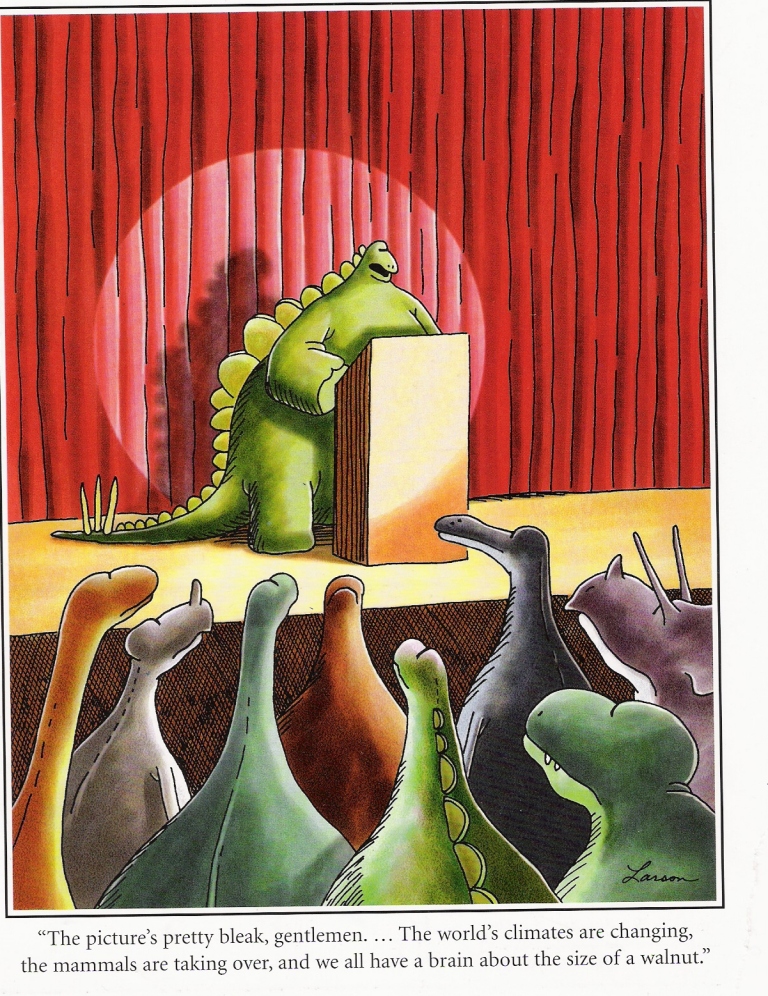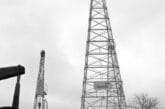The symptoms of climate change are clear, so we must transition away from fossil fuels through signing up for green power and supporting a carbon fee and dividend.


Solving the Climate Crisis
By Robert Haw, first published in the Pasadena Star
It’s like a Gary Larson cartoon. The evidence is overwhelming, it’s all around us. Fires, floods, and droughts – they keep coming and we just laugh them off. Cartoon-like for sure, although the joke might be on us.
The symptoms of climate change are clear, unambiguous and abundantly real. Climate scientists’ predictions are coming true, although they’re happening faster than anticipated. Ocean levels are rising and ice is melting. Look at the Arctic: September’s sea ice extent was less than half the 1970’s September coverage. And that’s just the tip of the iceberg because, as predicted, extreme weather events are occurring more frequently. The windstorm here in December 2011 brought unprecedented damage. The previous December (2010) L.A. County was inundated with a year’s worth of rain in less than a week. We saw record-setting heat and drought in the Midwest this summer, which was preceded by an unusually warm winter. Although there’s nothing unusual about droughts and storms, a continual setting of new records at the upper end, in rapid succession, is unusual. Since major droughts have major consequences, if we don’t heed scientists’ warnings and de-carbonize society, the effects of climate disruption will become commonplace in supermarket aisles. It’s happening right now, with corn and soy-based food prices up 60%.
As 350.org founder Bill McKibben pointed out in an article in the August 2nd Rolling Stone, the atmosphere has only a small margin for absorbing new CO2 before reaching 3.6º F (2º C) of warming. Coal is an especially dirty fuel because it releases roughly 150% more CO2 than natural gas or oil per unit of energy, as well as releasing mercury and other toxins. Assuming business-as-usual proportions, Earth’s “coal budget” is 85 billion tons worldwide before the bell on this count-down clock of warming tolls “midnight” (and we leave the climatic “safe zone”). Around the world there’s a fleet of approximately 2000 power plants burning coal. One of those is the Intermountain Power Plant (IPP) in Utah – a large plant that burns 5 million tons of coal per year and supplies Pasadena with much of its power. Multiply 2000 plants by say (just) 2.5 million tons of coal per plant and it equals 5 billion tons of coal per year. How long does that leave us before we exit the “safe zone”? By this analysis: 85/5 = 17 years. Using a different method (including all fossil fuels), McKibben computed 16 years. Heck, the war in Afghanistan has lasted almost that long.
Pasadena Water and Power, our publicly-owned electric utility, receives 60% of its electricity from IPP. According to PWP’s plans, IPP power will decrease to 40% in 2016. But that level of coal-dependency will then persist for at least another decade. Science is telling us we need to become coal-free within this decade, and to abandon fossil fuels entirely within 25 years. So what are our options? A rapid transition away from fossil fuels could increase electricity rates.
Alternatively, what might it cost to stay with coal? Coal costs are expected to rise anyway, but additional unexpected costs might include losing your roof in a severe windstorm, losing your backyard landscaping due to larger-than-expected storm runoff, or losing city streets because of inadequate storm sewers. It might mean soaring rent and / or association fees as insurance premiums and the cost of providing services rise. It might mean spiraling food and water prices as extreme weather events reduce agricultural output. It might mean less seafood as oceans acidify. It might mean job loss, as former sources of wealth in nature shrink. It might mean loss of your retirement annuity, as large financial institutions collapse because their investments have collapsed. These suggestions are not imaginary; they’ve already occurred elsewhere, maybe just not to you.
Munich Re is a re-insurance company, one of the largest in the world. They insure the insurance companies. Here’s what they’re saying, as reported in the October 10th edition of USA Today: “The number of natural disasters per year has been rising dramatically on all continents since 1980, but the trend is steepest for North America where countries have been battered by hurricanes, tornadoes, floods, searing heat, and drought”.
Fossil fuels are like the Pied Piper. We enjoy cheap energy now, but at what cost to our children? A stable climate has brought us abundance and opportunity. But by disrupting those patterns, those cycles of life, we stand to lose everything we’ve worked for because of irreversible climate change.
We can all make positive contributions to solving the climate crisis and here’s something you can do. Sign up for PWP’s Green Energy option. Customers choosing this option receive 100% wind-generated electricity. Go to:
http://ww2.cityofpasadena.net/waterandpower/greenpower/default.asp
Changing policy is also important, so tell your elected representatives that climate change matters to you. One way to do this is through the Citizens Climate Lobby. CCL is a non-partisan organization advocating for a federal fee on carbon-based fuels (increasing over time) that will speed the shift to clean energy. Returning 100% of the revenue from that fee to citizens will help make the shift to a carbon-free economy less stressful. And putting such a policy in place will make it in every utility’s self-interest to transition away from coal and fossil fuels, and into clean energy.
Robert Haw is a senior engineer at the Jet Propulsion Laboratory, and the founder of JPL’s Climate Change Symposium. He also volunteers for Citizens Climate Lobby.













Very clear, unambiguous “road map” on what must be done and WHY. Robert Haw is trying to wake us up in time. He gives specific actions any citizen can do to bend the curve towards a safer planet. May the jokers not doom us all.
I would also recommend calling in solar panel contractors to see if you can “go solar”. We did. We feel better about using electricity and will also save tens of thousands of dollars over the panels’ lifetime.
Pingback: Jan Freed: Mother Nature's Climate Wrath Will Be Costly | WilderUtopia.com